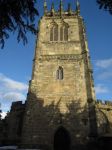Gresford (/ˈɡrɛsfərd/; Welsh: Gresffordd Welsh pronunciation: [ˈɡrɛsfɔrð]) is a village and a local government community, the lowest tier of local government, part of Wrexham County Borough in Wales.
According to the 2001 Census, the population of the community, which also includes the village of Marford, was 5,334, reducing to 5,010 at the 2011 census.
The Grade I listed All Saints' Church, Gresford has been described as the finest parish church in Wales, and has the most surviving medieval stained glass of any Welsh church. Its bells are one of the traditional Seven Wonders of Wales.
The former Gresford Colliery was the site of the Gresford disaster, one of Britain's worst coal mining disasters, when 266 men died in an underground explosion on 22 September 1934.
History
Located close to the England–Wales border with Cheshire, the settlement existed at the time of the compilation of the Domesday book, when it was recorded as "Gretford" within the Cheshire Hundred of Duddestan; it had a church, though perhaps not on the present site. The name, derived probably from Old English gras and ford ("grassy ford"), was later recorded as "Gresworth", "Cresford" and "Grefford", but documentary evidence shows that the place was clearly locally referred to as "Gresford" throughout its history, even under Welsh administration, and the other names merely represent alternative spellings. The Welsh form "Gresffordd", supposedly believed to indicate an etymology from y groesffordd ("the crossroads"), seems to have been the imaginative creation of Welsh genealogists of the 15th century and later. This form has, however, seen media use as an alternative spelling since at least the 19th century, and although largely unused by the mainly non-Welsh speakers of the village itself, is today often used by the Welsh press, and Welsh-language media.
In common with many of the towns and villages of the border lands, or Marches, Gresford has gone through periods of both English an
